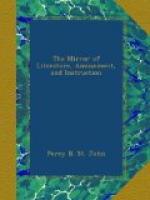Their Magnus Apollo no longer we follow,
He’s routed and flouted
and laid on the shelf,
And no poet’s address will now reach
him unless
He can play his own lyre and
flatter himself.
As for Bacchus the sot, he has drain’d
his last pot,
And must lay in the grave
his intoxicate head,
For although by his aid he his votaries
made
Full often dead drunk, they
have now drunk him dead.
O Mars, battle’s Lord! canst thou
not draw a sword,
As forth from its temple thy
statue we toss?
We want not thy lance, since our legions
advance
Beneath the bless’d
banner of Constantine’s cross.
Juno, Venus, and Pallas, to shame were
so callous,
And have always so widely
from decency swerved,
That it well might be urged, if their
statues were scourged
And then thrown in the kennel,
their doom was deserved.
The pontiffs and priests, who have lost
all their feasts,
And the oracles shorn of their
hecatomb herds,
Having nothing to carve, if they don’t
wish to starve,
Must feed upon falsehoods
and eat their own words.
O’er these mountebanks dead, be
this epitaph read,
“The Gods, Priests and
Oracles buried beneath,
Who were ever at strife which should lie
most in life,
Here lie all alike
in corruption and death.”
* * * * *
SPIRIT OF THE PUBLIC JOURNALS.
* * * * *
SHELLEY AT OXFORD.
A delightful paper, entitled, Percy Bysshe Shelley at Oxford is now in course of appearance in the New Monthly Magazine, from the pen of a fellow collegian and an early admirer of the genius of the youthful poet. It is in part conversational. Thus, Shelley loquitur:—
“I regret only that the period of our residence is limited to four years; I wish they would revive, for our sake, the old term of six or seven years. If we consider how much there is for us to learn,” here he paused and sighed deeply through that despondency which sometimes comes over the unwearied and zealous student; “we shall allow that the longer period would still be far too short!” I assented, and we discoursed concerning the abridgement of the ancient term of residence, and the diminution of the academical year by frequent, protracted and most inconvenient vacations. “To quit Oxford,” he said, “would be still more unpleasant to you than to myself, for you aim at objects that I do not seek to compass, and you cannot fail since you are resolved to place your success beyond the reach of chance.” He enumerated with extreme rapidity, and in his enthusiastic strain, some of the benefits and comforts of a college life. “Then the oak is such a blessing,” he exclaimed with peculiar fervour, clasping his hands, and repeating often—“the oak is such




